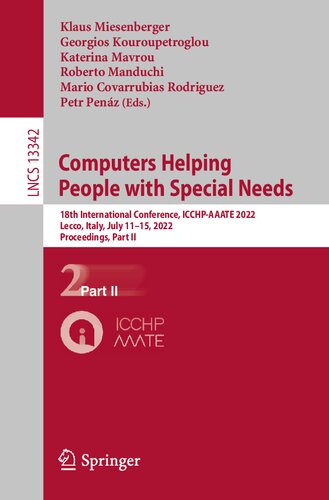

Most ebook files are in PDF format, so you can easily read them using various software such as Foxit Reader or directly on the Google Chrome browser.
Some ebook files are released by publishers in other formats such as .awz, .mobi, .epub, .fb2, etc. You may need to install specific software to read these formats on mobile/PC, such as Calibre.
Please read the tutorial at this link: https://ebookbell.com/faq
We offer FREE conversion to the popular formats you request; however, this may take some time. Therefore, right after payment, please email us, and we will try to provide the service as quickly as possible.
For some exceptional file formats or broken links (if any), please refrain from opening any disputes. Instead, email us first, and we will try to assist within a maximum of 6 hours.
EbookBell Team

4.1
80 reviewsThe two-volume set LNCS 13341 and 13342 constitutes the refereed proceedings of the Joint International Conference on Digital Inclusion, Assistive Technology, and Accessibility, ICCHP-AAATE 2022. The conference was held in Lecco, Italy, in July 2022.
The 112 papers presented were carefully reviewed and selected from 285 submissions. Included also are 18 introductions. The papers are organized in the following topical sections:
Part I: Art Karshmer Lectures in Access to Mathematics, Science and Engineering; Digital Solutions for Inclusive Mobility: solutions and accessible maps for indoor and outdoor mobility; implementation and innovation in the area of independent mobility through digital technologies; haptic and digital access to art and artefacts; accessibility of co-located meetings; interactions for text input and alternative pointing; cognitive disabilities and accessibility; augmentative and alternative communication (AAC): emerging trends, opportunities and innovations; language accessibility for the deaf and hard-of-hearing. Part II: Digital accessibility: readability and understandability; serious and fun games; internet of things: services and applications for people with disabilities and elderly persons; technologies for inclusion and participation at work and everyday activities; robotic and virtual reality technologies for children with disabilities and older adults; development, evaluation and assessment of assistive technologies; ICT to support inclusive education – universal learning design (ULD); design for assistive technologies and rehabilitation; assistive technologies and inclusion for older people.11 Chapters are available open access under a Creative Commons Attribution 4.0 International License via link.springer.com.